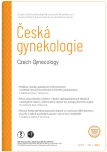Brain abscess as a rare complication of pelvic inflammatory disease
Authors:
Seinerová A. 1; Kopáčková M. 1; Buchvald P. 2; Pavlásek J. 1
Authors‘ workplace:
Gynekologicko-porodnické oddělení, Krajská nemocnice Liberec, a. s.
1; Neurochirurgické oddělení, Krajská nemocnice Liberec, a. s.
2
Published in:
Ceska Gynekol 2022; 87(1): 50-53
Category:
Case Report
doi:
https://doi.org/10.48095/cccg202250
Overview
Objective: Description of the case history of a brain abscess as a rare complication of pelvic inflammatory disease. Case report: We discuss a woman of reproductive age who had inserted a non-hormonal intrauterine device for seven years and developed pelvic inflammatory disease with no response to antibiotic therapy. After surgery, some neurological symptoms led to a diagnosis of a brain abscess. Conclusion: Brain abscess is a rare but potentially lethal complication from pelvic inflammatory disease, needing prompt diagnosis and interdisciplinary cooperation.
Keywords:
infertility – ectopic pregnancy – brain abscess – pelvic inflammatory disease – intrauterine device
Sources
1. Kreisel K, Torrone E, Bernstein K et al. Prevalence of pelvic inflammatory disease in sexually experienced women of reproductive age – United States, 2013–2014. MMWR Morb Mortal Wkly Rep 2017; 66 (3): 80–83. doi: 10.15585/ mmwr.mm6603a3.
2. Kolařík D, Halaška M, Feyereisl J. Repetitorium gynekologie. Praha: Maxdorf 2008 : 532–545.
3. Mašata J et al. Infekce v gynekologii. 3. vyd. Praha: Maxdorf 2017 : 148–167.
4. Ross J, Cole M, Evans C et al. United Kingdom national guideline for the management of pelvic inflammatory disease (2019 interim update). 2019 [online]. Available from: https: //www.bashhguidelines.org/media/1217/pid-update - 2019.pdf.
5. Bouyer J, Coste J, Shojaei T et al. Risk factors for ectopic pregnancy: a comprehensive analysis based on a large case-control, population-based study in France. Am J Epidemiol 2003; 157 (3): 185–194. doi: 10.1093/aje/kwf 190.
6. Li C, Zhao WH, Zhu Q et al. Risk factors for ectopic pregnancy: a multi-center case-control study. BMC Pregnancy Childbirth 2015; 15 : 187. doi: 10.1186/s12884-015-0613-1.
7. Kastenbauer S, Pfister HW, Wispelwey B et al. Brain abscess. In: Scheld WM, Whitley RJ, Marra CM (eds). Infections of the central nervous system. 3rd ed. Philadelphia, PA: Lippincott Williams & Wilkins 2004 : 479–507.
8. Smíšková D. Ložiskové nitrolební procesy infekční etiologie. Neurol pro Praxi 2006; 3 : 134–137.
9. Brouwer MC, Coutinho JM, van de Beek D. Clinical characteristics and outcome of brain abscess: systematic review and meta-analysis. Neurology 2014; 82 (9): 806–813. doi: 10.1212/WNL.0000000000000172.
10. Kupila L, Rantakokko-Jalava K, Jalava J et al. Brain abscess caused by Mycoplasma hominis: a clinically recognizable entity? Eur J Neurol 2006; 13 (5): 549–552. doi: 10.1111/j.14 68-1331.2006.01209.x.
11. Kum N, Charles D. Cerebral abscess associated with an intrauterine contraceptive device. Obstet Gynecol 1979; 54 (3): 375–378.
12. Rachdi K, Legros V, Mestrallet S et al. Multiple brain abscesses of gynecologic origin caused by Fusobacterium nucleatum. Réanimation 2014; 23 : 327–328. doi: 10.1007/s13546-014-0870-4.
Labels
Paediatric gynaecology Gynaecology and obstetrics Reproduction medicineArticle was published in
Czech Gynaecology

2022 Issue 1
-
All articles in this issue
- Pregnancy outcome prediction after embryo transfer based on serum human chorionic gonadotrophin concentrations
- Contribution of ultrasound examination in the detection of unexpected uterine and adnexal findings in reconstructive surgery for pelvic organ prolapse
- Accuracy of the Edinburgh Postnatal Depression Scale in screening for major depressive disorder and other psychiatric disorders in women towards the end of their puerperium
- Intramyometrial pregnancy after hysteroscopic resection of retained products of conception – a case report
- Fluidothorax as an atypical symptom of late ovarian hyperstimulation syndrome
- Hand-foot-mouth disease in puerperium
- Brain abscess as a rare complication of pelvic inflammatory disease
- Indocyanine green as a new trend in sentinel lymphatic node detection in oncogynecology
- Domestic violence in the clinical practice of gynecologists and obstetricians
- Preliminary cost variance modeling to compare autologous intraovarian platelet-rich plasma vs. standard hormone replacement therapy for menopause management
- Fetal neck giant hemangioma associated with postnatal arising Kasabach-Merritt syndrome
- Czech Gynaecology
- Journal archive
- Current issue
- About the journal
Most read in this issue
- Pregnancy outcome prediction after embryo transfer based on serum human chorionic gonadotrophin concentrations
- Accuracy of the Edinburgh Postnatal Depression Scale in screening for major depressive disorder and other psychiatric disorders in women towards the end of their puerperium
- Hand-foot-mouth disease in puerperium
- Indocyanine green as a new trend in sentinel lymphatic node detection in oncogynecology
